TFG’s Editor Deepesh Patel spoke to Stacey Facter, BAFT’s Senior Vice President for Trade Products, during BAFT’s Global Annual Meeting, held in Frankfurt from January 13-15, 2020. Anti-money laundering (AML) and sanctions were key compliance themes at the meeting, so TFG caught up to discuss how these could be tackled moving forward, and what’s in stock for 2020.
Featuring: Stacey Facter, SVP, Trade Products, BAFT
Host: Deepesh Patel, Editor, Trade Finance Global
Deepesh Patel: Stacey, thank you very much for joining us. Could you give me a quick introduction on what you do at BAFT?
Stacey Facter: Absolutely. I work for BAFT as the Senior Vice President, specializing in trade finance products to help our membership tackle trade related challenges globally. I see myself as an ambassador for trade, and my background is actually in banking.
DP: Trade finance compliance and regulatory themes were extremely pertinent in 2019. Could you give a rundown of the top trends that you saw in 2019?
SF: I think the most significant and important compliance-related issue for banks and other industry players is to clearly understand what is expected of them by regulators around the world. Every single day, for anybody who’s sitting in trade finance, there could be a surprise. I’d say the number one issue is that the bar is raised daily in terms of the expectations of a financial institution. In many cases, it’s identifying issues that aren’t even in the purview of a financial institution. We spend a lot of time talking to regulators globally, about financial crime compliance related to KYC (know your customer) and AML (anti-money laundering), articulating the importance of developing a consistent global approach. I would say that is the number one theme. There are many sub-issues in there, but I would say that’s the most important one.
DP: So, has this uncertainty had an impact on trade finance compliance, whether it be sanctions or tariffs, and so on?
SF: The answer is absolutely yes, regarding uncertainty. I was referring to it before because it really is what is expected of a financial institution, even in the sanctions space. What is the responsibility of a financial institution to identify the bad guys or to make sure we’re not doing business with sanctioned entities or sanctioned countries?
If for example OFAC issues a notice regarding ship-to-ship transfers of certain types of products, that may circumvent identification of their movement from or to a sanctioned country, what is the bank’s responsibility?
That has happened regarding North Korea; where OFAC issued an advisory alert that the banks were very concerned about, because of a lack of clarity of what was expected of them in order to identify sanctions abuses. Given that banks deal in documents, it is about whether they can track the ships? Certain people are pushing the envelope and answering yes; however, our role at BAFT is to contact OFAC to find out exactly what is expected of the FIs vs. other stakeholders in the supply chain. In this case, the advisory was mostly directed to the corporates.

Navigating Uncertainty through the Trade Finance Compliance
DP: Thank you, Stacey. I think that just goes to show the importance of BAFT when it comes to representing the industry, from the banks and FIs, to large bodies such as OFAC. I think, and I recall, Steven Beck, at the Asian Development Bank, held an excellent round table last year, can you explain what happened?
SF: Last April, Steven Beck brought together multiple stakeholders involved in the oversight of financial crime and compliance issues. He invited the regulators, banks, corporates and trade associations like BAFT – Tod Burwell, our president and CEO, was there. The idea was to bring everyone together with a goal to develop a global methodology related to regulatory compliance especially around AML. The participants identified multiple themes, and I can remember some significant ones that became actionable items for the industry to focus on in the latter part of 2019.

For starters, banks must file SARs (Suspicious Activity Reports). Right now, if you file one for a trade transaction, it’s very difficult to provide useful information that will really help law enforcement identify the abusers, as the form does not contain enough detail related to trade. One of the roundtable initiatives was to rewrite the SARs form for trade. And that is underway!
Another focus was the legal entity identifier (LEI), because of the challenges with inconsistent data across organizations and how sharing data may trigger privacy and confidentiality issues. As a result, there is a group promoting the usage of LEI. Then another group looked at global trade finance compliance requirements. We updated our Trade Finance Principles paper written a few years ago – I say we, as it was Wolfsberg, the ICC and BAFT, that developed it to provide clarification for practitioners. For example, what level of due diligence do you need to perform on your customers at onboarding and at the transaction level? What level of due diligence is needed for non-customers? Is it required? And how best to identify who the customer is. We looked at traditional trade products and subsequently, this past year, we looked at open account supply chain products, which were then added to the paper. It is publicly available for the benefit of all industry players. As a follow up from the round table, this year, we sent it to regulators globally. We are hoping to have some interesting conversations with them, once they receive and digest it!
The Digitization of Financial Compliance
DP: In your opinion, what are the most pressing issues that banks will be focusing on when it comes to trade finance compliance?
SF: I personally think that the most significant challenge today is addressing the compliance challenges posed by massive amounts of data and paper in the most impactful way. FIs are realizing the tremendous benefit of technology and specifically using artificial intelligence and machine learning. We’re all calling it digitization. There is a lot going on in this space!
The banks are challenged today. When banks analyse data looking for a sanction or an AML issue, it’s generally done on paper – and that paper becomes extremely cumbersome. It is challenging because there are so many false positives generated by the paper-based processes. Certain banks have identified fintechs to partner with, to develop programs using OCR (optical character recognition) or other technology solutions. The whole idea is to reduce the false positives, as millions of transactions are processed through banks’ systems every day. Many of the large global banks are already making significant investments, and I think there will be a point in time where the regionals will start looking at this as well.
The Unintended Consequences of Compliance for the End Consumer

DP: So let’s take a look now at 2020: what are the most important objectives for you?
SF: One of my most important objectives is to encourage global consistency in financial crime compliance. The conversation on trade-based money laundering is highly relevant for national and international security. We must encourage the support of all the stakeholders through a public private sector partnership. One place to start is in the U.S., where we are working to bring together all of the regulatory bodies to focus them even further on the importance of the issue. BAFT has the private sector relationships with the FIs and the suppliers supporting them, the regulators have government and agency relationships. So together we can build a public-private sector partnership that I like to call a village!
 Australia
Australia Hong Kong
Hong Kong Japan
Japan Singapore
Singapore United Arab Emirates
United Arab Emirates United States
United States France
France Germany
Germany Ireland
Ireland Netherlands
Netherlands United Kingdom
United Kingdom

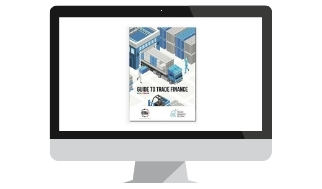

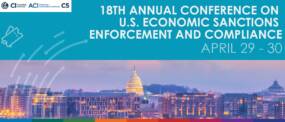

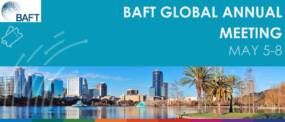
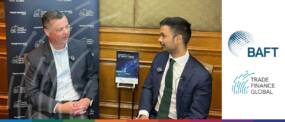

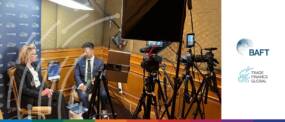
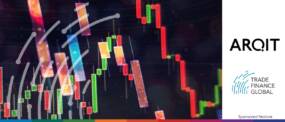
Comments are closed.